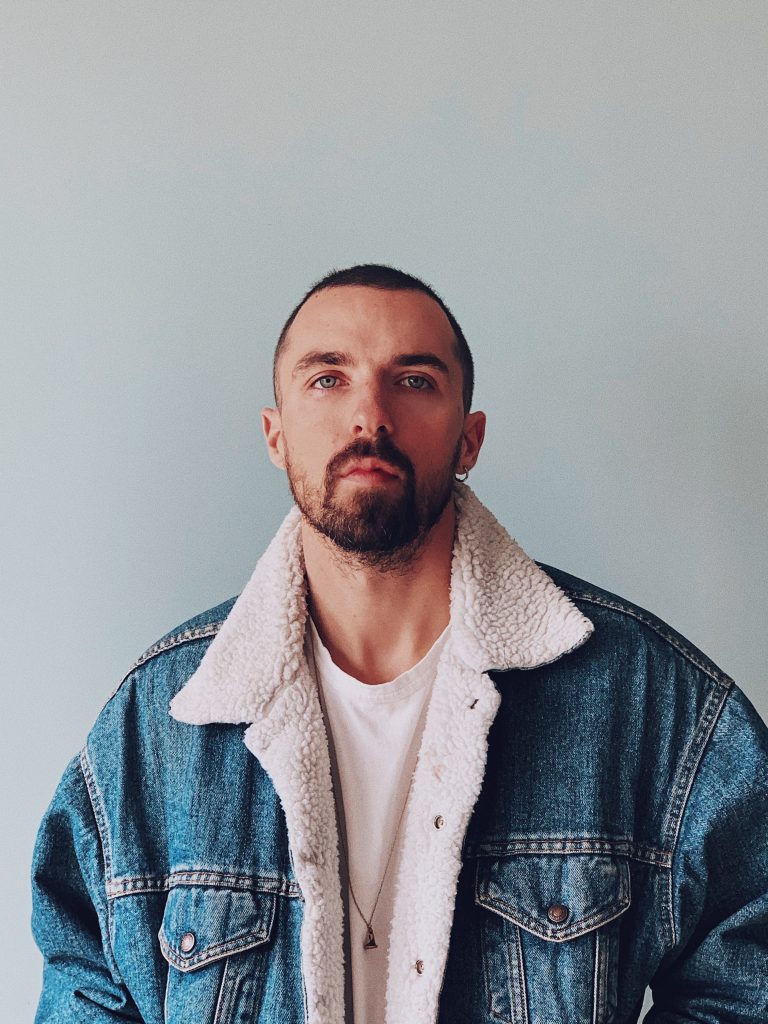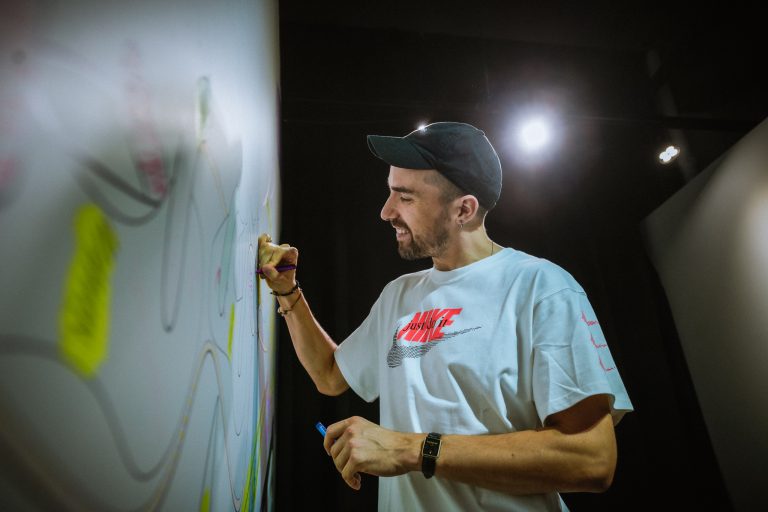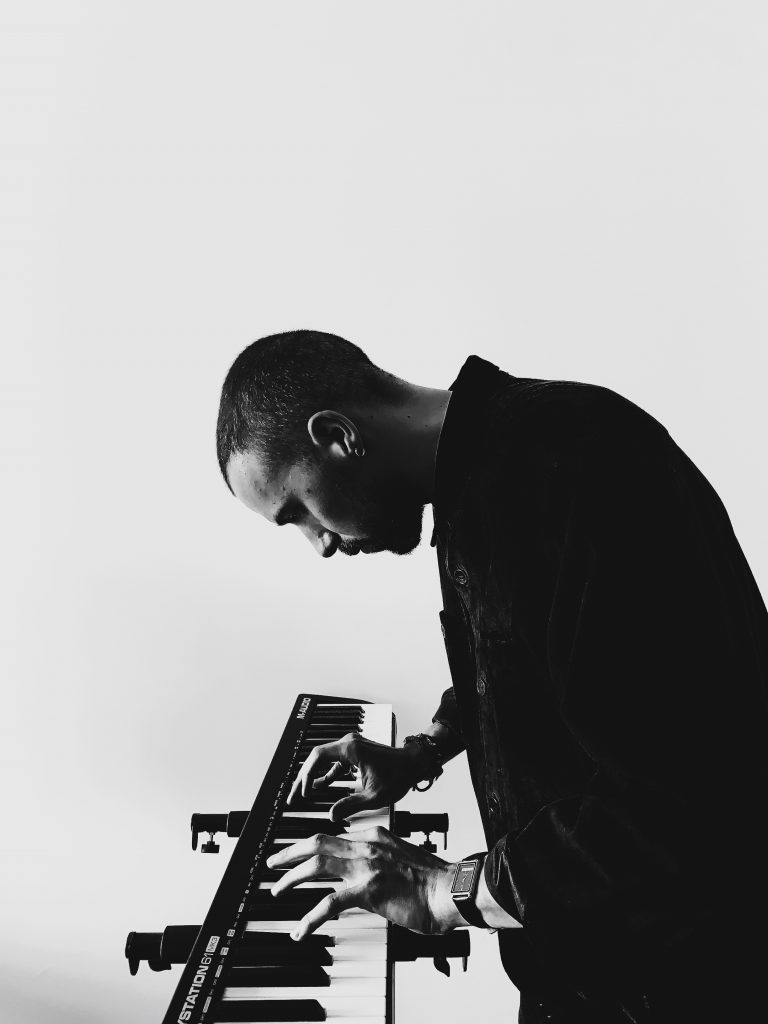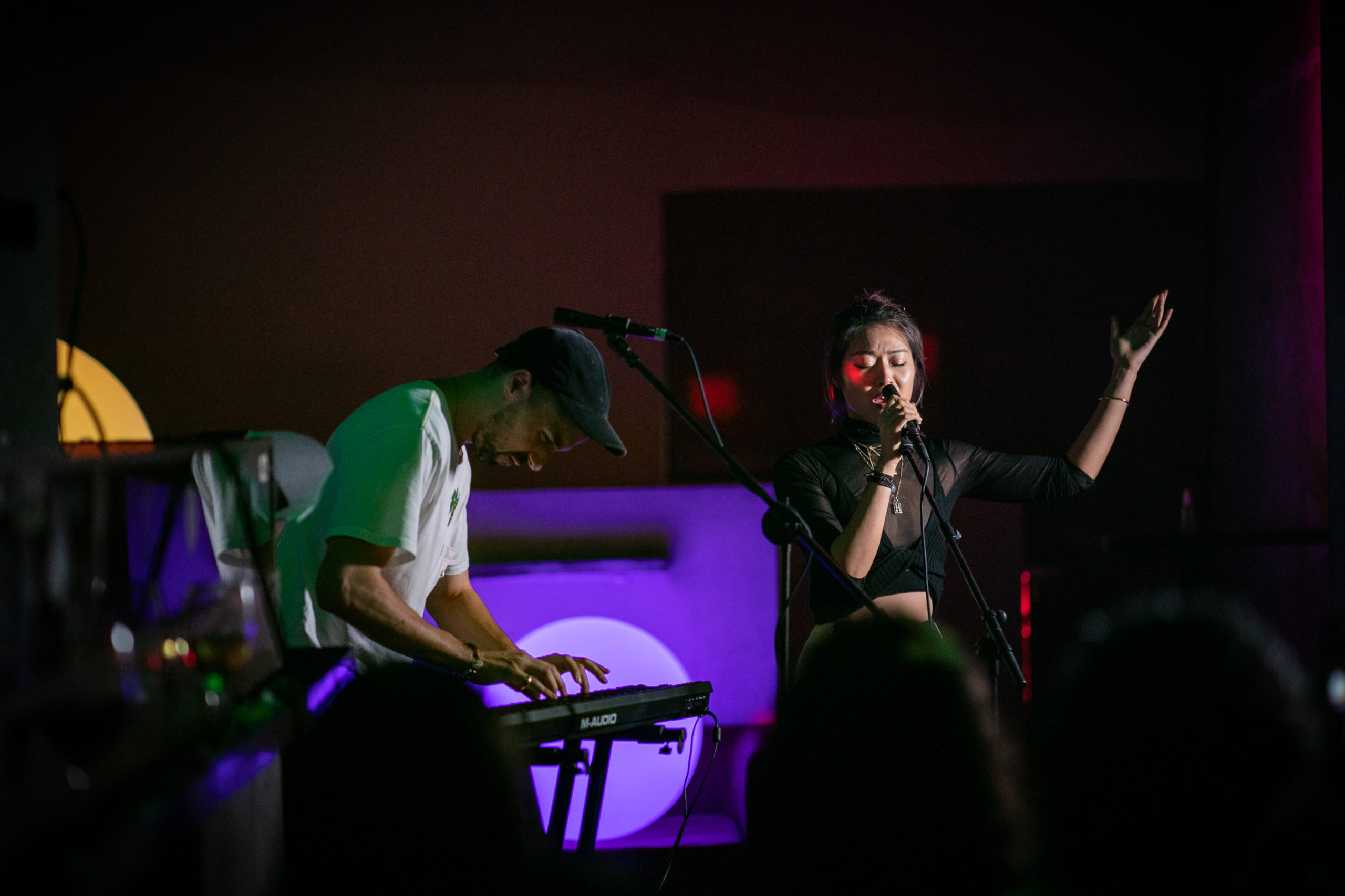In the age where we seem so ready and many might say ‘eager’ to share intimate details about ourselves online, we often lose out on immediate connections that are even more important. Gregory Williams, better known as O Ma Cassé, is a Shanghai and London-based musician and producer who sought to close this emotional gap between ourselves and our loved ones.
“Unspoken Lies” is a multidisciplinary project that combines a four-track EP with artwork, a launch video and a social campaign that invites users to be emotionally honest with themselves and the confidants they’d otherwise be afraid to disclose to. We recently spoke with him to hear about his full-circle journey between music, an extensive career in marketing and back to music as well as how the project came about.
— Unspoken Lies EP —
The Unspoken Lies EP is a musical narrative, supported by visual artwork.
Check out the story, the music, and some of the visuals below.

This is the story of two lovers who are dealing with emotional dishonesty.
She tries to reconcile with him, but he is evasive and secretive. Their relationship is at breaking point.
We travel inside his mind. He is consumed by secret fantasies, and battles the demons that are born from them.
Determined to seize power back in the relationship, she goes out alone at night seeking revenge, and gets it.
The couple meet again.
She openly shares her physical act of betrayal with him; but the real betrayal is that he still maintains his innocence and secrecy.
She knows then that the relationship is over.
The Unspoken Lies EP is available to stream on Spotify and Apple Music, and more information and lyrics are available at O Ma Cassé’s website.
Credits
- O Ma Cassé – writer, producer, instrumentalist, singer
- Madame Gao — singer, songwriter
- TingTing — rapper
- Jean Liu — filmmaker
- Holochr0me — designer
- Tahirih Brown — illustrator
— O Ma Cassé —
The Unspoken Lies EP is a musical narrative, supported by visual artwork.
Check out the story, the music, and some of the visuals below.

Tell us a bit about yourself, what you do now and how you got to where you are today.
I am a music producer and artist living in Shanghai and London. I grew up in a musical family — my mom’s a pianist and my sister’s a pianist — and was constantly exposed to music from age two. So I guess I kinda knew it was going to be the backdrop to my life.
I’ve been performing and writing music since I was like 6, and then I studied music throughout my education, including doing a music degree at Cambridge. So I did this very serious academic route of music, which is cool. But then really, what got me sparked with pursuing music was getting more involved in electronic music, and running (club) nights. I ran a house and techno night when I was 19-20 years old, which was super fun, and then moving to London exposed me to a wider range of musical subgenres in the UK.
That was my musical story growing up. After that, I spent six years working in marketing — on the agency side for Nike. It was a great six years, it allowed me to try living in the United States and ultimately its what brought me to China. But I decided about a year ago that I wanted to focus fully on music and use everything I’ve learned in marketing to help me do that.
Is there a specific or series of events that led you to go full-on into music?
I wouldn’t say one event, but I just felt that working in brand and communications, well, it’s creatively demanding.
I was pouring so much creativity into that business setting, I felt that my creative energy for music was not as high as I wanted it to be. I liked the job, but I wanted to pour my creativity into the art itself and then use marketing to make the art go further.
So I knew I had to make a significant change, I realized that I wanted to prioritize my life in a different way.

At a show and workshop at NikeLab Shanghai.
How did you arrive at the name O MA CASSÉ?
I wanted something that spoke to my ambition as a producer, which is to consistently produce high-quality things, things that are unique and distinct from each other. I don’t necessarily want to have one sound so people are like “oh that’s his sound.” I want to be able to add value and be creative in different areas, different projects.
So it reminded me a little bit of a Japanese omakase eating experience where you go in, you sit down, and the chef serves you a sequence of very high quality, but quite different things.
So I thought maybe that’s what I’m trying to do with music: serve up interesting, unique, and high-quality things.
How did you arrive at the name O MA CASSÉ?As opposed to being you said, not “one type of music” and maybe figuratively breaking the mold. Is there a bit of the wordplay in the “cassé” part?
Yeah, I love wordplay. I love that when I write lyrics. It’s the French word for ‘broken.’
I think you said it best yourself, trying to break the mold and not be tied down to one musical style; that doesn’t feel natural to me. I like to listen to a wide variety of music. A bunch of very popular stuff — literally Billboard 100, but at the same time, I listen to a lot of different subgenres from around the world.
I grew up listening to liquid D&B back in the day, techno, two-step, post dub, dubstep, all that stuff. And now I’m really into my old school, hip hop, and soul. I really respect and look up to Gilles Peterson, who I think, has done as much as anybody else to connect the world together, musically. I listen to all these kinds of sounds and it feels natural to me to draw off them when I create.
Is there a particular set of influences you gravitate towards, for say, personal listening or when it comes time to make music?
When I’m in the making mode, I listen to producers. I really like to go deep on the people behind-the-scenes; the people that actually make those sounds happen. Frank Ocean, for example, has an amazing sound, but it’s his producers that really help him craft that and consistently recreate that.
There’s a guy called Vegyn, who’s British and works with Frank. Another guy called Michael Uzowuru who also works with Frank, and a bunch of other guys like Rex Orange County. There are actually some amazing young producers coming out of China and Asia. There’s a guy called Harakiri out in Chengdu. He has more of a singular sound in general, but I think he’s a really really good producer.
I’m really into the new jazz scene in London and there are loads of talented musicians coming out in London right now in that scene.

“I felt I was pouring so much creativity into that business setting and I felt that my creative energy for music was not as high as I wanted it to be: I felt I had to make a significant change and that’s why I decided to leave that full-time job. I liked the job, but I felt I wanted to pour my creativity into the art itself and then make art go further. It’s still marketing the art, but doing it for the arts.”
— O MA CASSÉ
Describe the project. Could you speak a bit about the four different tracks? I just listened to the Unspoken Lies single and really liked it.
Oh, thank you! It’s been interesting putting it out there. It’s got some really great feedback from all angles. And also good constructive feedback like “I don’t love this part of it”. It’s been awesome, and I’m really open to all feedback at this stage.
The project is led by the four-track “Unspoken Lies EP”. Essentially, it’s a musical story centering on two protagonists, a couple in a relationship, and the four tracks tell a story of emotional dishonesty, of darkness, and ultimately, of transformation. My goal really is to invite the listener to consider the parallels in their own lives and what it means to them. It’s a project with a message and with an objective.
The lyrics use both English and Mandarin, which was a creative choice designed to heighten the sense of communication barrier between the couple. In terms of the music itself, I really wanted to push myself and push the boundaries of what a song format is. They’re all songs in some respect, but they disrespect traditional song boundaries to different degrees.
That first song that you’ve heard, in some ways it does follow quite a familiar song structure, but it doesn’t feel like it does because structurally it aims to deliver an operatic-style story. It’s pushing the boundaries and it was fun to create. The other tracks will probably be more accessible to listeners, particularly track three (“Burn”) and track four (“Crazy Talk”).
Each track has a distinct mood, ranging from the very intense and dramatic in Alter Ego to buoyant and dark humor in Crazy Talk. I’m stoked to release it all.
Could you talk a bit about the process you took to accomplish the Unspoken Lies EP? Is it anything like you’ve done in the past?
I started developing the musical material for this last summer. I was already writing, with ideas and themes, and then I had the inspiration for what this project was going to be, its theme and message.
In the late Autumn, I connected with the singer, Madame Gao. She’s in Shanghai and we’ve done a lot of sessions together over the last six months recording and writing in my studio.
I’ve really developed it piece-by-piece starting with track one and then working through it as the story unfolds: developing the music, bringing in new artists, writing lyrics, honing the narrative, then often returning to previous music to make sure it all fits together because it does have to work as one whole, not just four separate tracks.
Doing such an ambitious project has also been an amazing way to develop my own skills. Focusing my time on this project and on my music has allowed me to grow as a producer so much. I’m always learning new things as I work, so it has been super dope to see myself getting a lot better as I go.
Honestly, I hadn’t released much music until this project. I’ve always been writing my own stuff, but not releasing it, and working with other people, helping them do their stuff. This is the first big piece of work I really felt I wanted to put my own name to, so I see this as my opening offering to the world as an artist.

On stage performing with singer and friend Madame Gao.
How did you go about connecting with your collaborators? What was that experience like?
So there’s the singer from Shanghai, Madame Gao, who is a friend of mine. And then there’s a rapper from Nanjing who features on track three. Madame Gao and I are the two protagonists, we’re the couple, and we play those roles throughout.
Then the Nanjing rapper Ting Ting features on Burn, which is much more a pumping kind of rap track. I literally just went through my network to find her: I was looking for a young rapper who had a really unique sound. She has a really unique sound that’s super cool and quite dark. It’s not like most of the rap you hear coming out of China at the moment, which has very much the American trap feel.
So there are those two vocal artists and then a team of other artists — a filmmaker, an illustrator, a couple of designers — who are more on the visual side, based across the UK and North America and also in China.
I think the people who’ve actually ended up working on it were the peeps who believed in it and I guess they also believed in me. I just felt that they could bring something really unique in terms of their aesthetic to the project.
So I’ve been lucky, man, really lucky to find all these people.
I’m interested to hear about unexpected connections between things given you did come from a pretty extensive marketing background. I wanted to know if there are some specific approaches or skills that you brought over from that background into this project or that you’ll use as you promote it.
Because the project has a specific goal, I felt that how the project was presented to the world was really important. I didn’t want to only drop this as an EP. Producers and artists usually release an EP and the EP, along with a piece of album artwork, speaks for itself. That’s what the product is.
This project — because it’s trying to inspire people, but also trigger a behavior change — feels kind of like the brand campaigns that I used to run for Nike. In that sense, I knew that I was going to need more content and more pieces to the project than just the music and a piece of artwork. That’s really why I ended up working with this filmmaker, who’s actually based out of LA but used to live in China. What we’ve been working on is essentially a short launch film — a 30-second inspiration asset that brands like Nike use to launch campaigns.
We are launching this project to the world across social media with the video and with a series of social challenges in WeChat and Instagram. The challenges are designed to help more people engage with the project and share it on.
Obviously to listen to a whole EP, that requires a high level of attention.
Hopefully, people will be inspired by the story, but not everybody’s got that much time or attention. So we wanted to make more snackable and quick ways that people can get involved with Unspoken Lies and hopefully still have that same journey of inspiration and then considering behavior change.
I think working with the different collaborators to make this musical project into something bigger with much more scope is unexpected. It definitely was unexpected for me when I started! And I think it gives the project more potential scale than it otherwise would.
“The four tracks tell a story of the emotional dishonesty, of darkness and ultimately, of transformation. I think my goal really is to invite the listener to consider the parallels in their own life and what it means to them.”
Describe the pledge process and goals.
The pledge will be different depending on the platform because we’re launching across both Chinese and global social platforms and music platforms.
The unifying idea is to encourage people to privately share their unspoken lie. These are things that they have on their minds that they’ve done but didn’t feel great about, or things that they think about but they haven’t shared yet. Or even something that they worry about that they don’t feel confident to share with their loved ones.
We want to encourage people to share that in private, in a very safe space, and then actually go on to be that same set of ears for their own friends to talk to. So it has this network effect where people will feel the value of opening up about these things to somebody in private.
We hope it has a snowball effect of emotional honesty in a safe space.
What inspired you to embark on this project? Was there a specific moment that triggered it?
I think it was two things, really. Firstly, my own personal experience: a few years ago, I had to come to terms with my own emotional dishonesty. And coming to terms with that really helped me to understand the gray area between physical fidelity and emotional fidelity.
I think physical fidelity we’re all very comfortable with — we know what that means. But emotional infidelity, people tend to have a very vague understanding of what that actually means.
And secondly, talking to my friends about it, everyone felt that it was a confusing area and that they hadn’t really thought about it enough, what it meant for themselves. So combining my own personal experience with the thoughts of people around me, I felt this was a topic that doesn’t get enough attention, and one that can really be an empowering change if you choose to address it within yourself and then actually consider making a change in your life.
Why do you think there’s such a gap between what/how often we’re willing to share online versus what we share with those closest to us?
From my point of view, I feel the online world offers people a sense of detachment, a layer of detachment from one-to-one relationships. Right?
So a lot of the behavior that we see on the Internet and in social media, in particular, I think comes from this — it’s this decreased sense of responsibility, a decreased sense of repercussions, meaning people can do things more dispassionately.
And then when you’ve got to go and share something to somebody’s face or say something to somebody’s face, it’s a much more emotional experience and it’s much harder to do. There’s much more at stake. I feel for that reason, we’ve been conditioned to become very comfortable with sharing these intimate details of our lives with loads of the people we barely even know, but then actually fronting up and sharing something deeply personal and intimate with our closest people can be hard as a result.
Aside from taking those challenges, what do think would be the first steps towards repairing that gap?
Man, I’m going to be honest: I think it’s a long road. For me, I think the first step has gotta be taking the time to really connect with how you feel. How do you truly feel?
All of this change, in my opinion, starts from better self understanding. I think that that’s really important and it’s really hard in this day and age, when everyone’s so busy and people’s attention is quite disparate. And if you are maintaining relationships with so many people online, even the most surface relationships, that requires your attention, and everyone’s only got so much attention in their day.
Taking some time to reflect and understand yourself. I think also I’d love people to realize that emotional honesty is an act of love. It’s an act of love for the people who are closest to you and even though it’s difficult, love can be difficult, but it doesn’t mean it’s not worth it in the long run.
For yourself personally, how have you personally applied and actioned on the goals of emotional honesty?
I’m in a relationship, and I think in relationships, even very fulfilling and relatively smooth ones, there’s always going to be these things that you have in your mind, whether it’s things that you’ve done or whether it’s things that you’re thinking about.
Some things in my opinion, are best left unsaid. You have to exercise some discretion. But there are things which, once you share them, it’s the old adage, “a problem shared is a problem halved,” right? Having shared these things, you realize that actually they were not such a big deal. And even just the act of sharing can bring you closer to that person.
It’s great and it’s tragic. These things that we’re so afraid of sharing, those are the things which actually can drive you apart. In my relationship, I’ve made a distinct change in trying to always address how I feel about these things and then considering whether I want to share them. And the same can be said for close family and friends too.

“Some things in my opinion, are best left unsaid. But there are things which, once you share them, it’s the old adage, right? ‘A problem shared is a problem halved.’ There are these things that once you share them, you realize that actually they would not such a big deal. And it can bring you closer to that person.”




























